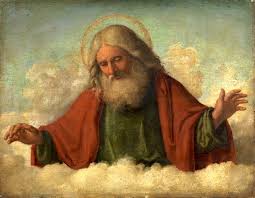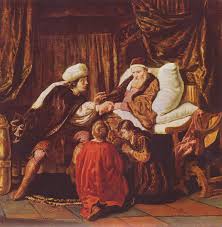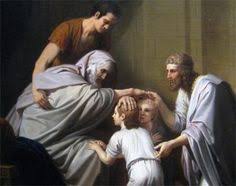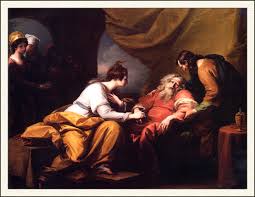
(Written
by Sheila Gail Landgraf)
We have heard how Jacob/Israel blessed Joseph and his two sons. After this happened, the other eleven sons were called to Israel’s side to listen to the last words their father had for them. The description of the sons of Israel also gives us a pretty clear picture of the actual history of mankind through time. All of the ways of mankind, both good and evil are seen in the personalities of Israel's sons, and in the wording of their blessings. There is such a mix of good, evil and everything in between both extremes. The blessings represent all types of people and point to their history during certain periods of time.
It is most striking to note that the two foreign born sons of Joseph, because of Israel’s legal adoption, are given the greatest blessings of all. They were not true citizens of Canaan, yet Israel held a great love and favor for them, so much so that he claimed them above all the others who bore his name. He saw the integrity of Joseph living in them. This sounds to me like the fate of all gentiles living in Christ. There might be technical difficulties in proving their bloodline, yet; through the adoption of a loving and caring God as Father, they have come into the royal family that God has chosen to bring his name to all of the earth.
Through adoption Ephraim and Manasseh were blessed. Through adoption the gentiles who believe on Messiah are blessed. God looks at us and sees the integrity of His Son Jesus Christ living in us.

Note
the order of the blessing of the sons is not determined specifically by their
birth or the order of their mothers, but certain prophetic and spiritual
factors are taken into account. These
blessings of the historical Israel also bring us to see a picture of how Israel will be in the last days, in that these words from the Patriarch were prophetic in nature. In The Sons of Israel we can see a story of all the people of the earth.
When it comes down to inheritance and blessings, the sons of Israel are very unlike
Ishmael, the son of Sarah’s maid in the days of Abraham. There was a much smaller inheritance for Ishmael because he was born to a servant, even though he was the firstborn of Abraham's seed. However, the sons of the servants/maids
of Leah and Rachel do not take a separate or inferior place because of the circumstances of their birth. They are blessed right along and together
with the sons of Leah and Rachel. It was what they had done during the time of their lives that Israel looked upon and either blessed them or cursed them. Israel was not looking through his own eyes, but he was guided by God's prophetic spirit as he proclaimed the destiny and fate of each son.

After blessing Joseph and his two sons named Ephraim and Manasseh, Israel addressed the sons of Leah, putting Zebulon
before Issachar.
Then he addressed
Zilpah’s sons, then Bilhah’s sons, (the sons of the two maids of Leah and
Rachel.)
He addressed Joseph again, publicly in front of the others, repeating what he had already told Joseph.
Last he addressed Benjamin, his
youngest son from Rachel.
So it might have been like this as Israel gathered his family together for this important family event and spoke with his first born; Reuben. Israel began speaking to Ruben by noting that he was the first born. He was the son that was born during the time of Israel's might, the first sign of his strength! When he was born he excelled in honor and power.
It is made very clear that originally
Israel had held much hope for Reuben and this is how his comments were given out for everyone to hear; but then the tone of Israel's voice must have changed as he continued this prophesy over Reuben.
“Turbulent as the
waters, you will no longer excel, for you went up onto your father’s bed, unto
my couch and defiled it.” As we studied
before, Reuben forfeited his birthright because of his sins both against God and his earthly Father. It was entirely his own fault. He had committed adultery with Bilhah, his
own father’s concubine and this had deprived him of his privileges of the
firstborn son. He had lost the respect of Israel forever.
It must
have been a very bad day for Reuben, but he had known his fate for a long time
now. Reuben had allowed his own lust to
guide him and he had not asked forgiveness or sought to reconcile this wrong that he had done. Reuben's common lustful sin is a very deadly sin we see that has been ruining otherwise good men of God throughout history. It was the very first sin committed by Adam and
Eve who were lusting after the forbidden fruit in the garden. Through the lust of the eyes Satan has robbed the Kingdom of God many
times over. In the scriptures this common weakness of man is spoken of as “the lust
of the flesh.” This was the sin that
caused Reuben to fall and it is the first sin that caused the fall of mankind. How very Interesting to note that the first
sin of man is played out in the picture of the words of Israel over his first
born son who had fallen too.
The
next words were spoken over Simeon and Levi:
“Simeon
and Levi are brothers. Their swords are
weapons of violence. Let me not enter their council, let me not join their assembly,
for they have killed men in their anger and hamstrung oxen as they
pleased. Cursed be their anger, so
fierce, and their fury so cruel! I will
scatter them in Jacob and disperse them in Israel.”
No kind
words for these two brothers who were next in line either! These two were so much alike. They encouraged one another in sin. We studied their sins during the time that Isreal was living in Schechem. There they committed the same sin as Cain,
the sin of violence and murder that comes from great anger and hate. It is a
sin that often rises in a man’s heart jealousy. God does not tolerate this sin forever, and thus it was this very sin that caused the flood
that God sent in the days of Noah.
Israel
did not tolerate this sin either. In the
scriptures this deadly sin is referred to as “The pride of life.” Many a man has fallen here, so did Simeon and
Levi. Corruption and violence were to have
no part in the forming of God’s people. They could not carry a blessing through the generations to come of Israel.
It
was also a bad day for Simeon and Levi, but they too knew they had it coming
and had lived with the knowledge for years now. They had not sought forgiveness or reconciled with their father for going against his wishes and ways. Nothing but trouble had come to Israel because of it.

Then we
hear of the refreshing blessing of Judah. Judah’s
blessing was true to his name, which means “praise.”
“Judah,
your brothers will praise you; your hand will be on the neck of your enemies;
your father’s sons will bow down to you.
You are a lion’s cub, Judah; you return from the prey, my son. Like a lion he crouches and lies down, like a
lioness who dares to rouse him? The scepter will not depart from Judah, nor
the ruler’s staff from between his feet, until he to whom it belongs shall come
and the obedience of the nations shall be his.
He will tether his donkey to a vine, his colt to the choicest branch; he
will wash his garments in wine, his robes in the blood of grapes. His eyes will be darker than wine, his teeth
whiter than milk.”
Judah had lived righteously before God and before Israel. Though he had made mistakes, he had repented and asked forgiveness. His heart was true to the causes of Israel and he worshiped The God of Israel.
Judah’s
blessing reflects the Golden Age of Israel.
It was the time that the nations around them were subdued and they prospered under God. It was the royal time of David and Solomon
all the way up to the Messiah who would own the scepter and the staff that Judah would pass on. This Messiah that would come from Judah's bloodline would be
called “The Lion of The Tribe of Judah.”
With the prophetic words of God from Israel's mouth, Judah was proclaimed a royal bloodline.
The One from the tribe of Judah will reign as the future Prince of Peace
and His dominion will be to the ends of the earth. Judah’s blessing held hope for a future for
mankind. Judah’s blessing held
prosperity, but it was short lived, because Judah had other brothers!
 After Judah was blessed Israel came forth with a message of assimilation and rejection
and apostasy for three other sons.
After Judah was blessed Israel came forth with a message of assimilation and rejection
and apostasy for three other sons.
The
next language from Israel which held both a historical and a future significance, went toward Zebulun, Issachar and Dan. Here are the words that Israel spoke:
“Zebulun
will live by the seashore and become a haven for ships; his border will extend
toward Sidon. Issachar is a rawboned
donkey lying down among the sheep pens.
When he sees how good is his resting place and how pleasant is his land,
he will bend his shoulder to the burden and submit to forced labor. Dan will provide justice to his people as one
of the tribes of Israel. Dan will be a
snake by the roadside, a viper along the path, that bites the horse’s heels so
that its rider tumbles backward. “
At
first these words over the three next sons sound so strange, but the history of
mankind has proven the meaning.
Israel came under the influence of Egypt, Assyria and Babylonia and the people were dispersed and assimilated. These were idolatrous nations and these three tribes of Zebulon, Issachar and Dan served their idols right along with them. Israel with his hand over them was seeing right into their future.
Zebulun,
whose name means “dwelling,” settled in the area of Sidon from which the
worship of Baal originated. This pagan worship
was brought to Israel by King Ahab. How this vision must have troubled Israel as he spoke the prophetic words over Zebulun.
Issachar, whose name means “hire,” submitted to forced labor and became
a slave. Israel's vision proclaimed this in his future. This too must have been very troubling to the dying man who wanted to leave his affairs in order before he went to meet God in eternity.
The prophecy Israel saw as he spoke to Dan was the most troubling of all. He looked into Dan's future and proclaimed these words over Dan, whose name means “judge. He saw into the future that Dan was to ”become
“like a serpent” and he knew in the last beats of his heart that Dan served Satan. Because of this fact eventually the tribe of Dan was brought down and rendered powerless. The tribe of Dan was often associated with
idolatry. With the fall of the tribe of
Dan into complete evil ways, the fall of Israel was also great. Because of the great sin of the tribe of Dan Israel was dispersed among the nations, and this remains the case with some, even today.

Regarding
the future, Dan is seen as a type of anti-christ who will eventually rule and reign over Israel for a time. Only the salvation of God will be able to
stop this.
I think
Israel was given divine prophetic insight as he proclaimed these harsh words
over his own sons, and that is the reason for the next line he muttered like a
prayer, like a cry for mercy he says; “I look for your deliverance LORD.” In his dying breath he is thinking of the tragic ending for these sons gone wrong. He wishes to change it for them, but he is helpless, the only one who can help is God and Israel cries out to God in pain and agony for these wayward sons upon his death bed.
Then Israel speaks of Gad: “Gad will be attacked by
a band of raiders, but he will attack at their heels.”

Gad means “troop” and though he must face
many hard battles in the end he will prove victorious and drive the enemy out
of the land. We have seen this happen with the people of Israel over and over again. They are sorely defeated, then they come back with an amazing resiliency and return to God.
History
will once again prove out. Perhaps in
answer to Israel’s plea in the earlier prayer; God will reveal His salvation. After the time of Dan, things for the nation of Israel will turn for
the better. Gad, Asher and Naphtali show
the results of God’s salvation for mankind in the end times that will come.
We hear
of the blessing for Asher: “Asher’s food will be rich; he will provide
delicacies fit for a king.” Asher is
destined to live up to his name, meaning “happy.” He will enjoy an abundance and share it with
others.
Asher portrays those who live uncomplicated lives, thriving on God's blessings and being thankful for them. This makes for happiness. It is very rare. Asher was blessed! Asher represents God's people receiving their eternal rewards and living with God in The Kingdom of God forever.
Then we
hear of Naphtali which means “my wrestling.”
The words spoken over Naphtali were:
“Naphtali is a doe set free that bears beautiful fawns.” The future time that is represented by the
salvation of Naphtali is a time of freedom, victory and salvation for the
tribes of Israel that are left. Perhaps
this is the time that the nation of Israel will recognize and acknowledge
Christ as Messiah. It is a turning point that symbolizes the complete freedom of the nation of Israel, that freedom was paid for by the blood of Christ. It is waiting for birth, even now. Naphtali received a great blessing, one even greater than Asher.

Finally,
the sons of Rachel are spoken of. Joseph and Benjamin are a such a beautiful portrait of the glory
of Christ in the millennial reign.
Joseph who was rejected by his brothers will be exalted by God. He represents Christ who sits at God’s right
hand and saves the world. We saw this
picture painted over and over as Joseph saved first the people of Egypt, then
the people of Israel because he was obedient to God in all things.
Joseph received
the richest blessing of all the sons. The words spoken
to Joseph during this time were: “Joseph
is a fruitful vine, a fruitful vine near a spring, whose branches climb over a
wall. With bitterness archers attacked
him; they shot at him with hostility.
But his bow remained steady, his strong arms stayed limber, because of
the hand of the Mighty One of Jacob, because of the Shepherd, the Rock of
Israel, because of your father’s God, who helps you, because of the Almighty,
who blesses you with blessings of the skies above, blessings of the deep
springs below, blessings of the breast and womb. Your Father’s blessings are greater than the
blessings of the ancient mountains, than the bounty of the age-old hills. Let all these rest on the head of Joseph, on
the brow of the prince among his brothers.”
It is clear that
Benjamin did nothing ever that displeased his father, but most of his blessings were
not obtained by anything that he earned, he was simply and unconditionally loved. Because he was so loved, he
received a share in the Kingdom of his noble brother Joseph and he was
eternally loved.
We see all the same things in the ages and different stages of the Church. Throughout the building
up of God’s church we see many failures, so many bad attempts to carry out the
royal intentions that God has bestowed both on a nation and a people; so many
failures, yet so much hope and occasionally, something that is good and right.
Through Joseph and Benjamin we see two
beautiful types of sons that represent the Son of God, Jesus Christ in past, present and future forms.
Thus, through the lessons learned from Israel’s
sons with all their curses and blessings, we can see the path to obtaining
spiritual maturity, both as an individual, as a nation and as a spiritual
body of believers.
Finally,
Joseph was repaid for his righteousness, his humility, his suffering and his
patience to wait on God for his salvation. He received the
greatest blessings and everyone who was associated with him received blessings
from how his blessing overflowed.
As you hear the words over Joseph you cannot help but remember the words of Jesus, "I am the vine, you are the branches." You have to think of The Good Shepherd and his rod and his staff. Joseph was a type of Jesus as the Messiah who walked the earth. The spring mentioned is the Holy Spirit working in Joseph's life and the lives of his seed. Joseph is clearly representing with his blessing the fruit of the reign of Our Messiah, Jesus Christ, a time of righteousness and truth, a time of plenty and abundance, a time of healing for the nations of the earth. How Israel must have loved seeing the visions of Joseph!
Then we
come to Benjamin, the youngest, beloved son of Jacob. Benjamin had suffered in childbirth and his
mother had died giving birth to him. He had grown up with his Father’s favor . These are the words that Israel uttered over
Benjamin: “Benjamin is a ravenous wolf;
in the morning he devours the prey, in the evening he divides the plunder.”
To me,
Benjamin’s blessing is the strangest and hardest to understand, but perhaps he
represents one, or even a people, who will be blessed by the blessing of their older brother as the land is ruled by his good rule. Benjamin seems to be someone who will benefit from all the wars and someone who
will divide the plunder or take what is left of this world’s blessings and
enjoy them forever. Perhaps Benjamin represents the nation of Israel during the millennial reign of Christ.
Altogether
through Israel’s sons we see quite a varied map of the condition of the men who have tended
to planet earth from generation to generation throughout the times of history, including some from the past, present and future. We see a mix of good
and bad and divine and evil. We see sin
that brings judgment and punishment. We
see forgiveness that brings salvation and unconditional love. We see wars and suffering and times of abundance
and plenty.
We can
also see the patterns of the times that change and change again as men are always learning to
live with God. We see blessing, defeat,
transition, change, victory, abundance and joy in different stages, just as the
sons of Israel have experienced so many different things at different times.
And when the time has come, God
will give to each of us the appropriate blessings, just as Israel did to his
sons, according to our spiritual maturity.
The
last instructions Israel gave to all of his sons concerned his death. He instructed them, as he had previously
instructed Joseph, to bury him in the cave in the field of Machpelah, near
Mamre in Canaan, which Abraham had bought along with the field as a burial
place from Ephron the Hitite.
Israel was to rest where Abraham and Sarah had been buried.
Israel was to rest in the land where Isaac and Rebekah were buried.
Israel would find his own resting place next to the spot where Israel had
buried his first wife Leah.
Not long after these last instructions where given,
Israel breathed his last breath and was gathered to his people.











